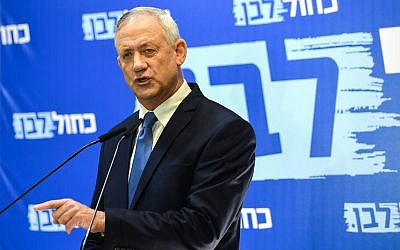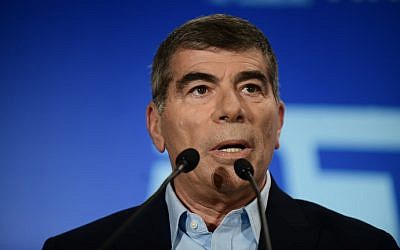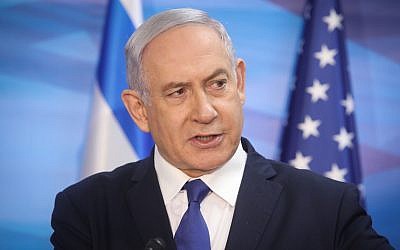Joint List head Ayman Odeh breaks with longstanding position, but sets conditions that include ‘ending the occupation,’ nixing nation-state law, fighting crime rates in Arab areas

Israel’s top Arab lawmaker, Joint List chairman Ayman Odeh, said he is willing under certain conditions to join a center-left government, in a reversal of the longstanding opposition of Arab-majority parties to joining a coalition. His comments were made in an interview snippet published Thursday.
Odeh was confirming remarks he made to The Times of Israel earlier this month, when he was asked whether he would join a coalition led by Blue and White party leader Benny Gantz. He answered that “if we see that there is some common direction, we will seriously consider joining him.”
At the time, however, the comments were walked back by a Joint List spokesperson who insisted Odeh had merely been referring to unspecified “cooperation with Blue and White” — not an alliance in government.

While Gantz has not officially ruled out including the Joint List in a future coalition, he has previously said he was only open to a coalition with Zionist parties, apparently excluding the Arab-majority factions.
On Thursday, the Yedioth Ahronoth daily published a preview of an interview with Odeh that will be published in full on Friday, leading with a quote of him saying he was “willing to join a center-left government.”
In a tweet Thursday, Odeh added another major demand that wasn’t mentioned in the report: “Ending the occupation,” referring to Israel’s military rule over the West Bank. That condition would make his party joining the government extremely unlikely.
Chances for that scenario materializing were never high, since Odeh’s partners in the Joint List — an alliance of the Hadash, Ra’am, Ta’al and Balad parties — are mostly vehemently opposed to it. Ta’al on Thursday said they were against joining the government.

Even within Odeh’s own Hadash faction, which is the most dovish of the four, the report said most members rejected Odeh’s position. He said he “welcomes” the debate.
Gantz also has not commented on Odeh’s statement, but fellow Blue and White lawmakers Gabi Ashkenazi and Yoaz Hendel ruled out the possibility of a future government partnership on Thursday.

“We think Israel’s Arab citizens are equal and that’s how we should treat them,” Ashkenazi told Army Radio, but added: “We won’t be able to sit [in a government] with the Arab parties that don’t recognize Israel as the state of the Jewish people.”
Blue and White MK Hendel similarly said his party would “form a wide unity government” that includes Netanyahu’s Likud. “We respect Israel’s Arab citizens and view them as citizens worthy of all rights, but we will not sit with the Arab parties which fundamentally reject Israel’s existence as a Jewish state. Full stop.”
Public Security Minister Gilad Erdan of the ruling Likud party was quick to react, tweeting that “now it is clear that whoever votes Blue and White will likely get a left-wing government with a terror supporter.”
He criticized Odeh’s demands, saying they would lead to “rampant illegal construction” and unfairly blames the high crime rates on police and the government. He also attacked the demand for funds for women’s shelters, saying that “to educate and talk against violence” takes precedence.
A centerpiece of Prime Minister Benjamin Netanyahu’s campaign against Gantz, his main challenger for the premiership, both before the April election and in the run-up to September’s vote, has been his allegation that the Blue and White chairman will be unable to build a ruling coalition without the backing of Arab parties. Arab parties have never served in an Israeli coalition government, but have supported minority governments from the outside.
On August 1, the last day of party registration for the September 17 elections, Odeh told The Times of Israel that he might “seriously consider joining” with Gantz if the former IDF chief of staff wins the election, but said the scenario was unlikely because of the centrist leader’s reservations.

“I don’t think that Gantz is ready,” he said. “He would prefer to form a national unity government [with Likud] over what we want. But if he turns to us and he is going in the right direction of peace and equality, we will listen. I don’t see it happening because of a lot of bad water under the bridge. We are not in his pocket. He will have to come to us.”
The Joint List was formed ahead of the March 2015 national elections, after the Knesset raised the electoral threshold, increasing the percentage of the vote a party must win to enter parliament from 2% to 3.25%.
The slate brings together parties from across multiple ideological divides, including socialists, nationalists, secularists and Islamists.
In recent years, Arab-majority parties have grown in size, reaching a peak of over 10 percent of votes cast in the 2015 election, when the Joint List won 13 seats, becoming the second-largest opposition party.
The party split into two factions for the April 2019 race, and voters responded by reducing their combined showing to 10 seats.
As reported by The Times of Israel
